

NewEd. EDUCATION.
Bespoke Learning. Society for Learning Analytics Research. Neuro Learning. New Learning Skills. New Memory Aids. Other Learning. Scientific Speed Reading: How to Read 300% Faster in 20 Minutes. (Photo: Dustin Diaz) How much more could you get done if you completed all of your required reading in 1/3 or 1/5 the time?

Increasing reading speed is a process of controlling fine motor movement—period. This post is a condensed overview of principles I taught to undergraduates at Princeton University in 1998 at a seminar called the “PX Project”. The below was written several years ago, so it’s worded like Ivy-Leaguer pompous-ass prose, but the results are substantial. In fact, while on an airplane in China two weeks ago, I helped Glenn McElhose increase his reading speed 34% in less than 5 minutes.
I have never seen the method fail. The PX Project The PX Project, a single 3-hour cognitive experiment, produced an average increase in reading speed of 386%. Can I Learn to Read Faster and Get Through My Backlog of Books? Advice on how to read faster is all good and well, BUT:

Learn to Speed Read in Just a Few Hours. I’m not one for making big New Year’s Resolutions as I am a continual goal setter and look at life plans and goals on a weekly or at least monthly basis, so I don’t need one day a year to pretend I’m actually going to change the year, I just always do that.
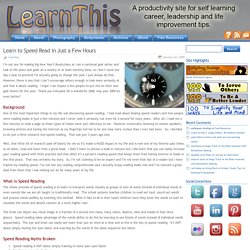
However, there is one that I can’t encourage others enough to look more seriously at and that is about reading. I hope I can inspire a few people to put this on their own goal sheets for the year. Thank you everyone for a wonderful 2008, may your 2009 be even better! 7 Speed Reading Tricks by a Former Book-Hater. I was never a big fan of reading… I blame it on the education system, of course.
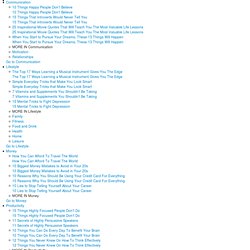
(Well, it can’t be my fault, can it?) You see, it’s difficult to enjoy reading when every book your teacher throws at you is of no interest to you whatsoever. So I hated it. It was a chore, not a pleasure. Learn Interesting Facts Everyday. Strategies Quick Learners Use To Pick Up Anything. Stealing & Explaining Tech Sites. Big Thinkers: Judy Willis on the Science of Learning. Judy Willis: Hi, I'm Judy Willis and I am a neurologist.
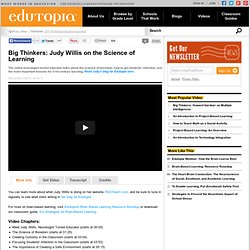
I've been a neurologist for 15 years and after the 15 years my patient practice really changed. I started getting so many referrals for kids whose teachers thought they had ADD, obsessive compulsive disorder, staring spells, seizures petit mal epilepsy, and the increase was huge and yet the kids had no greater incidence of it. And I saw the notes were coming from the school so I visited the schools. Lifelong Learning Programme 2007-2013. Comenius - Action for school The Comenius programme focuses on the first phase of education, from pre-school and primary to secondary schools.
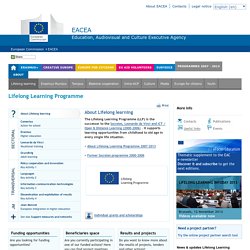
It is relevant for all members of the education community: pupils, teachers, local authorities, parents associations, non-government organisations, teacher training institutes, universities and all other educational staff. Learn more about Comenius Erasmus - Higher education Erasmus is the EU's flagship education and training programme in the field of higher education.
Individual grants and scholarships are managed by the National Agencies (please click the link "Individual grants and scholarships" below to contact them), while Erasmus centralised actions designed to support cooperation projects are managed by the EACEA. Learn more about Erasmus centralised actions Leonardo da Vinci - Vocational training The Leonardo da Vinci programme links policy to practice in the field of vocational education and training (VET). Rethinking thinking - Trevor Maber. An excellent way to better understand the Ladder of Inference is to work in a small group and talk about a pattern of behavior that everyone can relate to.
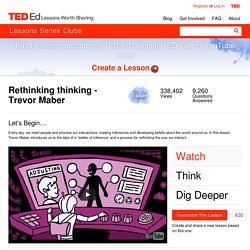
Some examples (in addition to the parking lot example) include: someone cutting in front of you in a line at the store; a friend or family member who is always annoyingly late; or someone who leaves you disappointed because he/she breaks more promises than he/she keeps. As you each share your experience, focus on what assumptions are at play, the conclusions you are each drawing from those assumptions, and what emotions you feel as a result. World of Ideas: Isaac Asimov. Some Differences Between Experts and Novices. Harrisburg Presentation Resources Here are some resources from my presentation in Harrisburg.

Defining and Exploring Gamification from Karl Kapp Here is some additional information. Articles and Blog Entries of Interest 8 Types of Stories to Effect Change Storytelling and Instructional Design Eight Game Elements to Make Learning More Intriguing Games, Gamification and the Quest for Learner Engagement Gamification, […] Continue Reading → 2014 DOE Symposium Conference Resources Here are my resources for the 2014 DOE Symposium Conference. Continue Reading →
Teaching Expert Learners. Harrisburg Presentation Resources Here are some resources from my presentation in Harrisburg.

Defining and Exploring Gamification from Karl Kapp Here is some additional information. Articles and Blog Entries of Interest 8 Types of Stories to Effect Change Storytelling and Instructional Design Eight Game Elements to Make Learning More Intriguing Games, Gamification and the Quest for Learner Engagement Gamification, […] Continue Reading → 2014 DOE Symposium Conference Resources. Finding Flow by Mihaly Csikszentmihalyi – Summary. Gamification. Institute of Play.
Game theory. Game theory is the study of strategic decision making.
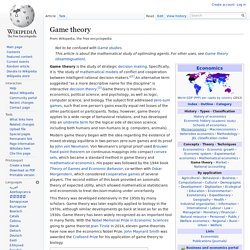
Specifically, it is "the study of mathematical models of conflict and cooperation between intelligent rational decision-makers. "[1] An alternative term suggested "as a more descriptive name for the discipline" is interactive decision theory.[2] Game theory is mainly used in economics, political science, and psychology, as well as logic, computer science, and biology. The subject first addressed zero-sum games, such that one person's gains exactly equal net losses of the other participant or participants. Exploding Myths About Learning Through Gaming : NPR Ed. "What makes a game fun is not that it's easy," says Greg Toppo, "but that it's hard. " Smcgee/Flickr hide caption toggle caption Smcgee/Flickr. Brainpoints_chi. Curse of knowledge. The curse of knowledge is a cognitive bias that leads better-informed parties to find it extremely difficult to think about problems from the perspective of lesser-informed parties.
The effect was first described in print by the economists Colin Camerer, George Loewenstein and Martin Weber, though they give original credit for suggesting the term to Robin Hogarth.[1] History[edit] While the economists Colin Camerer, George Loewenstein, and Martin Weber were the first to "coin" the term "curse of knowledge" and to describe, and effectively, define this phenomenon, they are self-reportedly not the first individuals to document or study the effect; on the other hand, in their publication they state that: "All the previous evidence of the curse of knowledge has been gathered in psychological studies of individual judgments", referring readers to Baruch Fischhoff's work from 1975, which also involves the hindsight bias.[2] Applications[edit] See also[edit] References[edit] Upload your mind and live forever — Hopes&Fears — flow "Science"
The Back Page. By Carl Wieman In the pages of APS News and elsewhere there has been much discussion about the deficiencies of our science education system. Everyone from leaders of government, industry, and academia to concerned parents is pointing to the evidence and lamenting how these deficiencies hinder economic growth and the attainment of a scientifically literate citizenry capable of making wise informed decisions on important societal issues.
The Useless Class. It happens. You've enrolled in a completely useless class. You know the one. The Future Of Storytelling: Immersion, Integration, Interactivity, Impact. As technology becomes more advanced and more accessible across multiple platforms, it’s only natural for consumers to expect increasingly higher standards of creativity and engagement from content creators. Top Ten Reasons To Play Go. Go Infinitesimals at Sensei. In combinatorial game theory (CGT) infinitesimals are games of temperature zero where the whole point is to get the last move. To Test a Powerful Computer, Play an Ancient Game. DEEP BLUE's recent trouncing of Garry Kasparov sent shock waves through the Western world. Science, Creativity and the Real World Gifted Homeschoolers Forum.
Science, Creativity and the Real World: Lessons Learned from the U.S. Homeschool Community. Autopoesis & cognition.pdf. My Design Process: Everything You Need to Know. Note: "Types of Creative Thinking" This article doesn’t focus on ePortfolios but rather this woman’s approach to creativity and how/why creative thinking is important for students to practice: 7 Ways to Combat Your Own Cognitive Dissonance. “Sometimes people hold a core belief that is very strong. When they are presented with evidence that works against the core belief, the new evidence cannot be accepted. 60 Small Ways to Improve Your Life in the Next 100 Days.
Contrary to popular belief, you don’t have to make drastic changes in order to notice an improvement in the quality of your life. Pourquoi le Mindmapping est-il si efficace pour étudier ? Pourquoi dit-on que le Mindmapping peut aider les étudiants ? Est-ce vraiment si efficace ? Learning in the Future. Conventions of Writing Humanities Papers. Read These Seven Books, and You’ll be a Better Writer. GUARDIAN ANGEL KIDS online ezine for Kids! Download Apps and Watch Video. What schools need: Vigor instead of rigor - The Answer Sheet. Partition congruences and the Andrews-Garvan-Dyson crank. SearchingForSolutions. Durable Inequality - Charles Tilly.
Self improvement. SOS 1: Thinking & Learning. Apprendre à apprendre. The Learning. LEARNING. GROK. Think! Memory. Well Read. Τέχνη. Ple. Language Learning. Lingua Franca. Language Etymology. Once Upon A Time. About Education. NeWeb Teams. Geekiness. Elder Care.